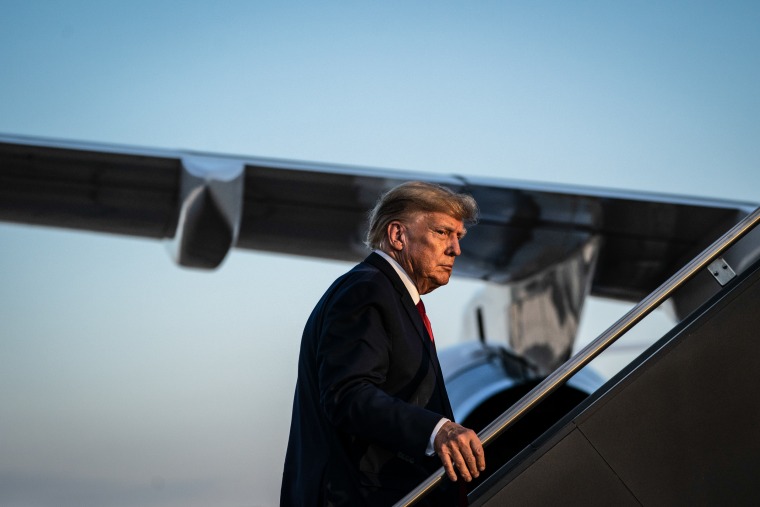It was just four days ago when Donald Trump responded to the United States coming up short in the World Cup by celebrating the defeat of his own country’s team. While common sense suggests the bare minimum of patriotism would lead an American politician to root for American athletes in international competition, the former Republican president actually taunted the U.S. women’s soccer team.
As part of an online harangue, Trump went so far as to argue, “Many of our players were openly hostile” to the United States.
That wasn’t true — none of the women on the team expressed any such hostility — though there was a degree of irony to the circumstances: The former president was questioning the athletes’ patriotism while simultaneously rejoicing in the loss of his country’s team.
Two days later, as HuffPost noted, Trump expressed a preference for enjoying the south of France rather than being in the United States.
Trump, who has frequently expressed disdain for America and Americans, made the comment during a campaign rally in New Hampshire on Tuesday as he griped about the criminal charges against him and lamented ever getting into politics. “I could have been relaxing at Mar-a-Lago or in the south of France ― which I would prefer being in this country, frankly,” he said.
As a video clip of the comments suggested, this was not a scripted comment: The former president apparently just said what he was thinking.
After seeing this, my first thought was about partisan asymmetry. Indeed, it’s worth pausing to imagine what the reaction might be if a Democratic presidential hopeful, after rooting against an American team, said he or she would prefer to be in the south of France rather than the United States.
It’s also worth noting that if Trump acted on this preference, he might not enjoy the reception: As recently as 2020, the Republican’s final full year in the White House, a report from the Pew Research Center found that Trump was wildly unpopular in France.
But it was the back-to-back comments that struck me as especially notable: On Sunday, the former president applauded a U.S. defeat in the World Cup tournament, and on Tuesday, he’d rather be in France than his own country.
This comes less than a year after Trump used his social media platform to describe the United States as, among other things, “evil.”
Given this, I continue to find it remarkable that questions about the former president’s patriotism aren’t louder.
Indeed, none of this is especially new. Revisiting our previous coverage, it was two weeks after his 2017 inauguration when Trump sat down for an interview in which he was reminded that Russia’s Vladimir Putin is “a killer.” Trump replied, “There are a lot of killers. We’ve got a lot of killers. What, do you think our country’s so innocent?”
As we discussed at the time, Americans generally weren’t accustomed to hearing their president be quite this critical of the United States. What’s more, the idea that the American chief executive saw a moral equivalence between us and a brutal autocrat came as a reminder that Trump didn’t always hold his country in the highest regard.
It was part of an unsubtle larger pattern. In December 2015, then-candidate Trump was asked about Putin’s habit of invading countries and killing critics. “He’s running his country, and at least he’s a leader,” Trump replied, “unlike what we have in this country.” Reminded that Putin has been accused of ordering the murder of critics and journalists, Trump added, “Well, I think our country does plenty of killing also.”
In a July 2016 interview with The New York Times, the Republican went on to argue that the United States lacks the moral authority to lead, because we’re just not a good enough country to command respect. “When the world looks at how bad the United States is, and then we go and talk about civil liberties, I don’t think we’re a very good messenger,” he said.
There’s never been a president, from either party, who’s been so cavalier about America lacking in credibility. Sentiments such as “When the world looks at how bad the United States is...” are usually heard from America’s opponents, not America’s president. The Atlantic’s Jeffrey Goldberg noted during the 2016 campaign that Barack Obama “has never spoken as negatively about America as Donald Trump has.”
The Republican also explicitly rejected the idea of “American exceptionalism,” questioning aloud whether the United States really is “more outstanding” than other nations.
To be sure, it’s a free country. If Trump wants to argue that the United States is “evil,” that’s his right. If he’s convinced that the United States is not a force for good in the world, he’s welcome to make the case. He can also root against U.S. athletes and dream of spending time on foreign soil. All of this, of course, is his business.
But it’s more than a little jarring to see the Republican, at different times, both claim the moral high ground on patriotism and run down his own country in ways no former president has ever done.
This post updates our related earlier coverage.

